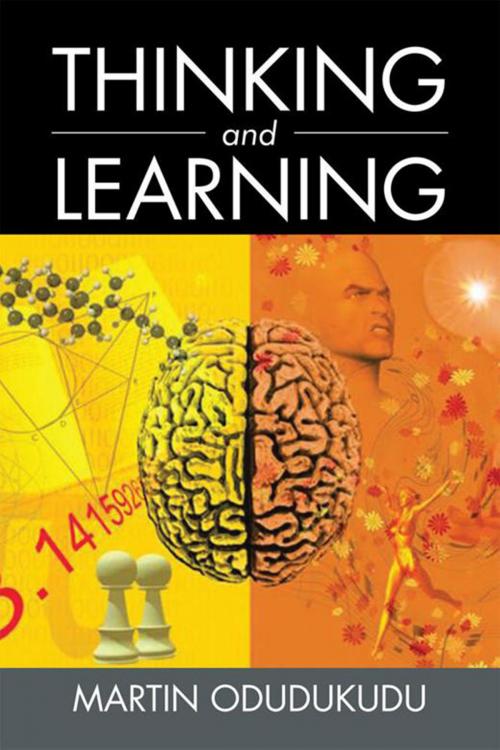| Author: | Martin Odudukudu | ISBN: | 9781483624341 |
| Publisher: | Xlibris US | Publication: | April 26, 2013 |
| Imprint: | Xlibris US | Language: | English |
| Author: | Martin Odudukudu |
| ISBN: | 9781483624341 |
| Publisher: | Xlibris US |
| Publication: | April 26, 2013 |
| Imprint: | Xlibris US |
| Language: | English |
Students want to learn and excel as learners. However, a student cannot learn optimally on his or her own especially. If a student had not already learned how to learn, student may be ineffective and/or unproductive in learning independently. Student learns best how to learn from adults that can provide such learning. However, in the name of educating a child an adult may imposed tasks upon student. Here, student learn to pay attention to imposed tasks just enough to get a disciplinarian who imposed tasks off their backs while secretly devoting attention to concerns that are truly of interest to the students. Furthermore, an adult may sugar coat a task in order to shield student from the unpleasant the experience of tasks and in their minds facilitate student learning. Here, student may engage task, but student learns in the task that it is his or her whims that are important; he or she learn to make demands or otherwise fail to do assigned tasks. In both cases, students do not learn to learn well. We cannot say that a student is learning well when all that a student may be doing is pay just enough attention to imposed task to get a disciplinarian off his or her back while secretly devoting attention to concerns that are truly of interest to the students. Similarly, we cannot say that a student is learning when all that students is doing is practicing and/or becoming increased practiced in making demands and failing to do assigned tasks. Some teachers may be moderate when they commit these mistakes, and they convince themselves that because they are not extreme, they therefore do not harm students. This may be right in so far as human limitations prevent us from having an absolute best learning practice/method. However, in terms of having a best focus that would help students to learn well, many teachers fail because they do not learn what to look for in helping students to learn well. In Thinking and Learning, we advance the theory that to help students to learn well, teachers must learn to focus upon student interest. Dewey, 1934 point out that without an understanding of student interest, a teacher may not know the direction a student is heading; without an understanding of student interest a teacher may not be able to help students to learn well, and students grope. In Thinking and Learning, we define interest in terms of tendencies that one expresses when in the midst of objects/problems; we point out that in interest one seeks to extricate self from problems, one thinks. We point out that this type of thinking differs from thinking where one is seeking to secure an object/advantage and gratify self. In the last chapters of Thinking and Learning, we develop an instructional program that focus upon fundamentals of what and how a student does when a student is in the midst of objects or problems and seeking to extricating self from them just as we focus upon fundamentals of what and how a student does in a task situation when a student seeks to accomplish tasks and secure a represented advantage. We point out that the learning that is of significance to student is one in which student learn to generate, develop, and consider their concerns. Accordingly, in the last chapters of Thinking and Learning you will learn about the instructional methods of Goal and Task Thinking and Learning (GTTL); here, Goal Thinking and Teaching refer to student tendencies when a student is determining a direction for self, and Task Thinking and Teaching refer to student tendencies when a student is executing a plan to secure a determined advantage.
Students want to learn and excel as learners. However, a student cannot learn optimally on his or her own especially. If a student had not already learned how to learn, student may be ineffective and/or unproductive in learning independently. Student learns best how to learn from adults that can provide such learning. However, in the name of educating a child an adult may imposed tasks upon student. Here, student learn to pay attention to imposed tasks just enough to get a disciplinarian who imposed tasks off their backs while secretly devoting attention to concerns that are truly of interest to the students. Furthermore, an adult may sugar coat a task in order to shield student from the unpleasant the experience of tasks and in their minds facilitate student learning. Here, student may engage task, but student learns in the task that it is his or her whims that are important; he or she learn to make demands or otherwise fail to do assigned tasks. In both cases, students do not learn to learn well. We cannot say that a student is learning well when all that a student may be doing is pay just enough attention to imposed task to get a disciplinarian off his or her back while secretly devoting attention to concerns that are truly of interest to the students. Similarly, we cannot say that a student is learning when all that students is doing is practicing and/or becoming increased practiced in making demands and failing to do assigned tasks. Some teachers may be moderate when they commit these mistakes, and they convince themselves that because they are not extreme, they therefore do not harm students. This may be right in so far as human limitations prevent us from having an absolute best learning practice/method. However, in terms of having a best focus that would help students to learn well, many teachers fail because they do not learn what to look for in helping students to learn well. In Thinking and Learning, we advance the theory that to help students to learn well, teachers must learn to focus upon student interest. Dewey, 1934 point out that without an understanding of student interest, a teacher may not know the direction a student is heading; without an understanding of student interest a teacher may not be able to help students to learn well, and students grope. In Thinking and Learning, we define interest in terms of tendencies that one expresses when in the midst of objects/problems; we point out that in interest one seeks to extricate self from problems, one thinks. We point out that this type of thinking differs from thinking where one is seeking to secure an object/advantage and gratify self. In the last chapters of Thinking and Learning, we develop an instructional program that focus upon fundamentals of what and how a student does when a student is in the midst of objects or problems and seeking to extricating self from them just as we focus upon fundamentals of what and how a student does in a task situation when a student seeks to accomplish tasks and secure a represented advantage. We point out that the learning that is of significance to student is one in which student learn to generate, develop, and consider their concerns. Accordingly, in the last chapters of Thinking and Learning you will learn about the instructional methods of Goal and Task Thinking and Learning (GTTL); here, Goal Thinking and Teaching refer to student tendencies when a student is determining a direction for self, and Task Thinking and Teaching refer to student tendencies when a student is executing a plan to secure a determined advantage.















